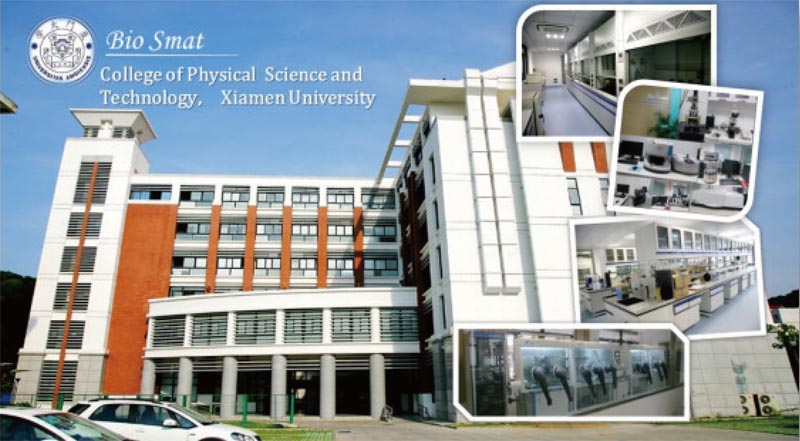
LOCAL INFORMATION
About Xiamen University
XMU offers many programs in humanities, social sciences, natural sciences, engineering and technology, management, arts education, medical science and others, conferring a full range of bachelor's, master's and doctoral degrees. The university currently contains 26 schools, 66 departments and 9 research institutes with a total enrolment of about 40,000 full-time students, including 20,454 undergraduates, 16,546 master’s students, and 2,797 doctoral students. At present, there are over 2500 students from Hong Kong, Macao and Taiwan and from other parts of the world, and it has over 2,500 full-time faculty and professional researchers, including 11 academicians of the Chinese Academy of Sciences and 12 adjunct academicians. The university now offers 83 undergraduate programs, 279 master programs, 185 Ph.D. programs, and 15 post-doctoral research centers established in different fields. Five subjects have been accredited and awarded as "the national key broad disciplines ", 9 subjects have been accredited and awarded as "the national key sub-disciplines ", and 9 "national educational centers for talents" have been approved. Currently XMU is also the home of more than 150 research organizations in various fields, among which are: 5 state key laboratories; 1 state engineering laboratory; 1 state engineering & technology research centre; 5 ministry-level key laboratories; 3 ministry-level engineering & technology research centers; and 5 ministry-level key research bases for the liberal arts.
Furthermore, it has established inter-university cooperative ties with over 250 institutions of higher education worldwide such as UK, USA, Japan, France, Russia, and the regions of Hong Kong, Macao, and Taiwan. The university is situated amidst picturesque scenery, with its campus stretching along the seashore at the foot of mountains, a desirable environment for learning via well-equipped with first-class campus network and libraries.
 Xiamen University is regarded as one of the most beautiful universities in China. More information concerning XMU, refer towww.xmu.edu.cn
Xiamen University is regarded as one of the most beautiful universities in China. More information concerning XMU, refer towww.xmu.edu.cn
The Department of Physics at Xiamen University was founded in 1924, and has enjoyed its longtime history ever since. It served as a member of five-university semiconductor consortium in 1950s, stood as a key department for nationwide “211” and “985” projects. It is organized into six sub-leveled topical areas: theoretical physics, condensed matter physics, biophysics and soft-condensed matters, optics, astrophysics and cosmology, as well as radio physics. In the past nine decades, upholding principles of conducting solid work and striving for excellence, the department has steadfastly aimed at goals of cultivating capable and creative world-class scholars.
During recent four years, the department has actively recruited renowned scholars, developed advanced education and research platforms, helped promote the economy in local areas, and built leading-role groups in areas of condensed matters, soft matters, and astrophysics. Among them, the groups in soft matter, grapheme and astrophysics have published three papers in Nature series (the coauthored paper published in Nature was ranked as one of 10 main scientific breakthroughs in China in 2015). The study of mimicking Faraday rotation to sort orbital angular momentum of light was selected as one of the China’s Most Prominent Breakthroughs in Optics in 2014.As one of the top-ranking universities in China and directly affiliated with the Education Ministry, Xiamen University (XMU) is located in the coastal city Xiamen, Fujian Province. It was founded in 1921 by Tan Kah Kee, a well-known overseas Chinese businessman and philanthropist, making XMU the first one in China founded by an overseas Chinese. Since its founding, the university has educated over 150,000 undergraduates and postgraduates.
The Research Institute for Biomimetics and Soft Matter (Bio Smat) established by the department of physics is referred as a Ministry of Education 111 Intelligence-Recruitment Scheme, a provincial key laboratory, and one of national research centers that are equipped by the state-of-art facilities, house most densely-populated soft-matter excellent scholars. As the first joining member of ICAM, it takes the leading role in compiling and editing the soft and condensed matter physics in “Strategies of Science Developments in China”. It has been chairing the soft-matter session of CPS Fall Meeting for many years. It acts as the compiler of soft matter physics terminology in Chinese Encyclopedia, and the principal editor and advisor for soft matter physics book series.

More campus views:http://www.xmu.edu.cn/xyfg.asp
3D campus map:http://map.xmu.edu.cn/gcampus/index.html
The Bio Smat webpage:http://rwz.xmu.edu.cn/